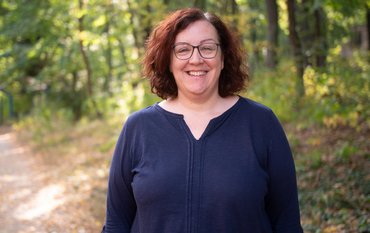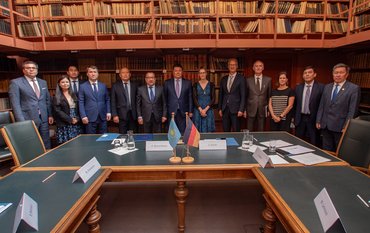“The ice on Greenland is melting faster and faster. And we want to find out which factors influence and accelerate the process.” This is how Liane G. Benning outlines her team's research work on Greenland's huge glaciers. Every year, she travels there with a group of researchers to study tiny organisms that darken the surface of the ice.
Dialogue between science and society
The researcher heads the Interface Geochemistry Section at the GFZ German Research Centre for Geosciences in Potsdam and is a professor at the Free University of Berlin. She will present her work and important results in the public “Leopoldina Lecture” on September 14 in Potsdam.
Her lecture is part of the program of the 133rd Assembly of the Society of German Natural Scientists and Physicians (GDNÄ), which will take place from 12 to 15 September on the campus of the University of Potsdam in Griebnitzsee. The GDNÄ (founded in 1822) is one of the oldest German scientific associations and is committed to promoting dialog between the natural sciences, medicine and technology as well as between science and the public. This includes the biennial meetings and their lecture program.
Project on ice: Deep Purple
Together with international colleagues from Aarhus University, Liane G. Benning is leading the “Deep Purple” project, which has received around 11 million euros in funding from the European Research Council ERC via a so-called “Deep Purple” program.
The single-celled algae produce dark pigments to protect against the high UV radiation and thus darken the surface of the snow and ice. This in turn means that less sunlight is reflected. As a result, the surface heats up more than with “clean” snow and ice, leading to increased melting. “The algae optimize their habitat themselves, so to speak, as they need liquid water,” says Liane G. Benning. The biological darkening exacerbates the problem of glacier melting accelerated by climate change.
In her lecture, she will discuss the significance and extent of the algal bloom as well as the team's laboratory work and life in tents on the ice.
Leopoldina lecture by Prof. Dr. Liane G. Benning:
The great melting - small cells, big consequences
Saturday, September 14, 2024, 5.30 pm
University of Potsdam, Griebnitzsee Campus, Lecture Hall Building (House 6), Lecture Hall H5
Griebnitzsee S-Bahn and regional train station
Address: August-Bebel-Straße 89, 14482 Potsdam
Admission is free.
Further information on the program:
https://www.gdnae.de/wp-content/uploads/2024/06/2024_GDNAe_Programmheft_Postdam.pdf
Read an interview with Liane here:
https://www.gdnae.de/en/liane-g-benning-how-algae-are-fuelling-climate-change/


![[Translate to English:] Ice landscape with five red tents](/fileadmin/_processed_/8/9/csm_Zeltlager_auf_dem_Eis_Urheberin_Jenine_McCutcheon_6c893b6300.jpeg)
![[Translate to English:] Researcher, standing, in plaid shirt, head slightly tilted, arms crossed](/fileadmin/_processed_/b/3/csm_Liane_G._Benning_Urheber_Phil_Dera_9e51c035f7.jpeg)









![[Translate to English:] [Translate to English:] Abror Gafurov von dem Schriftzug "Welcome to Azerbaijan" und den UN und COP Logos](/fileadmin/_processed_/2/5/csm_2024_11_Baku_COP29_Abror_Gafurov_1042faec82.jpeg)


![[Translate to English:] Martin Herold standing in front of the library on the Telegrafenberg](/fileadmin/_processed_/c/d/csm_Martin_Herold_d385ee4dd9.jpeg)
![[Translate to English:] Many people are listening to a presentation in the GFZ lecture hall.](/fileadmin/_processed_/c/a/csm_1_Bild1_hell_b9c0e9f5ed.jpeg)






![[Translate to English:] Both scientists sitting on stools in front of a wall of books in the Telegrafenberg library](/fileadmin/_processed_/6/6/csm_Buiter_Castell_DORA_4_e87cb1ea18.jpeg)
![[Translate to English:] Gruppenbild mit 4 Personen](/fileadmin/_processed_/8/d/csm_20241017_GFZ-Emmerman-Medal-005_web_reinhardtundsommer_21a414fa4a.jpeg)









